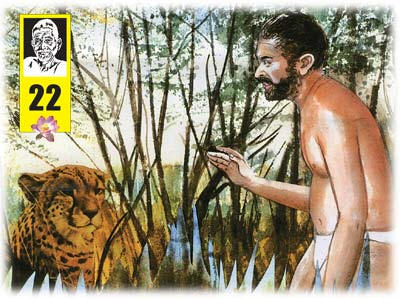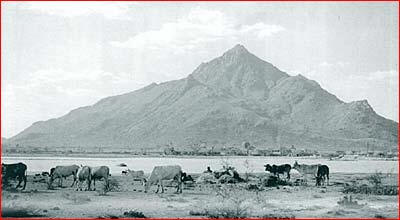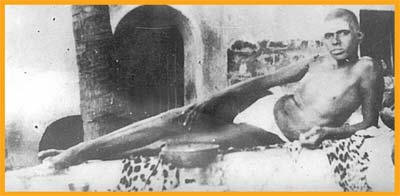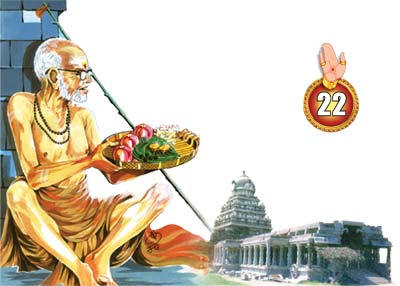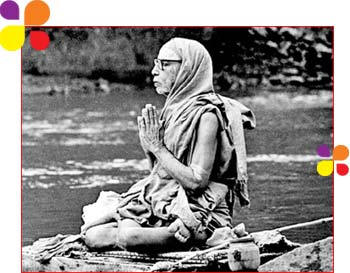Ramanamaharishi22
Sakti Vikatan 2011-02-08
Part 1 & 2
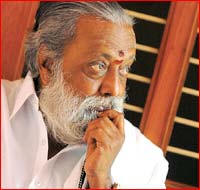 Bālaswāmy’s
disciples were percipient of their life goals. Once challenged by the
boorish manager of the choultry, they went to the individual houses and
begged for food. They did not fight for or demand food at the choultry. They
raised no ruckus saying, ‘Serve us now or go to hell.’ They moved away
with no conflict. (Instead of the usual two devotees, four devotees
showed up at the choultry for food. That irritated the manager of the
choultry.)
Bālaswāmy’s
disciples were percipient of their life goals. Once challenged by the
boorish manager of the choultry, they went to the individual houses and
begged for food. They did not fight for or demand food at the choultry. They
raised no ruckus saying, ‘Serve us now or go to hell.’ They moved away
with no conflict. (Instead of the usual two devotees, four devotees
showed up at the choultry for food. That irritated the manager of the
choultry.)
We have a lesson here. It is sagacious silence to avoid showy service,
and go for loving service. The germ of paddy is so humble (and look at
its yield). Guru’s
proximity, the disciple’s hubris and ego of ‘I’, ‘Me’ and ‘Mine’ are
recipe for destruction.
A great Pandit brought a bunch of Bananas. He could have given it to
Mahan directly. Thinking God is loftier and greater, he offered one
banana to God and the rest of the bananas to this god (Balaswamy).
He offered the Prasada of bananas to Mahāṉ.
Mahāṉ
looking at him said, “I will take the banana offered to Vinayaka.”
Pundit was shocked beyond belief and addressed him mentally, ‘I have in
me a matter, which I want you to find out and tell me.’ That also was
told by Mahan and the matter came to fruition.
Bālaswāmy never said that he knew things by his internal cognition.
There were no words or signs. This is Jñāṉi’s
greatness. His mind is a crystal.
The life of Bālaswāmy later known as Sri Ramana Maharishi was a series
of wonders. That quality that does not disturb (move) the tip of a paddy
made an impress on us and kindled a desire in us, ‘Why can’t I have that
Buddhi?’
Isāṉya Mutt inmates ate mush-balls of his leftover food regarding them
as Prasada from Bālaswāmy.
Seeing that, Bālaswāmy gave up eating on banana leaf, receive on and eat
food from the palm of the hand.
Food items served on banana leaf have six flavors. The Siva Nivēdhanam
food received on the palms of the hand has no added salt. We sigh inside
observing the simplicity made simpler and the feeling of satisfaction in
Bālaswāmy with what he got by begging, to appease hunger with no added
salt. That attitude of Bālaswāmy induces in us a great respect for him.
All knowing and powerful Jñāṉi
is simple in his habits.
How and in what ways? Pomp and circumstance
are essential for the simpletons. That simplicity with no publicity
gives us joy.
There are several lessons in the life story of Sri Ramana Maharishi.
In the year 1906, plague was rampant in Tiruvannamalai. The health
officials requested Bālaswāmy to stay outside the city
limits. Bālaswāmy stayed in
Pacchaiamman Temple in the north-east quarter of the city with his disciples.
Swāmy
used to say he witnessed Pacchaiamman coming into the temple. Pārvatidevi
came to Tiruvannamalai to perform Tapas (austerities) and went first to
Gautama Muni’s
Āśram.
Later she chose a place near the Āśram and performed Tapas. Pacchaiamman
Temple is the place wherein Pārvatī performed Tapas before it became a temple
site. Since Parvati’s complexion was like Marakatham (மரகதம்,
emerald), she was called Pacchaiamman (Emerald-colored Goddess).
Bālaswāmy and his disciples took bath in the nearby lakes and used the
water for drinking, cooking…
Rangasami Iyengar from Chennai used to visit Bālaswāmy often. When he
came, it was high noon and so waded into the lake for a bath.
Bālaswāmy emerged from the Pacchaiamman Temple rather suddenly and hurriedly. The disciples thought he was going out to attend to the calls of nature. But, that was not the case.
A panther living in the nearby forest was going towards the
lakeshore to quench its thirst at high noon.
Bālaswāmy faced the panther and addressed it in a soft voice, ‘Come back
in a little while. If Rangasamy sees you, he will be afraid. Go away for
the time being.’ The panther moved away.
Bālaswāmy looking at Rangasamy coming to the shore alerted him not to
take a bath in the lake at high noon, the wild animals’ time for a drink
at the lake.
He did not tell him anything about the panther, which Balaswamy earlier
persuaded to back off temporarily. It appears that wild
animals are also submissive (cooperative and responsive) to Bālaswāmy.
Bālaswāmy is the paragon of simplicity (and virtue). Bālaswāmy used a cloth given by
a disciple as bath towel. In due course of time, the cloth became frayed
at the borders
and looked tattered and torn. He never opened the towel in the presence of
anyone. He rolled it into a ball and used it for drying himself. He hid
and dried it in the crevice between the rocks.
A disciple of Bālaswāmy seeing the frazzled bath towel in the crevice was in grief.
He said, “We have so many boxes of clothes in store for our use. We
remained unconcerned about your ragged cloth.” He was ashamed and cried.
Seeing the disciple in grief over the ragged cloth, he agreed to take a
cloth and a Kovanam, a short loin or goin cloth). Simplicity was his nature. No simplicity was taught
here. On the contrary, it
was the lifestyle (of the Jivan Mukta).
Other sages wanted Bālaswāmy to be part of their group. They had the
desire to claim him as a member of their Mutt and ilk, as they
noticed his simplicity in his speech, food preference, deed and behavior
(as worthy of emulation).
A Pandit from Sringeri came to visit with him and later spoke with him
on many (philosophical, esoteric and self-aggrandizing) matters.
The Pandit notified Bālaswāmy, he was going to the foothills for lunch
and to give him proper answer upon his return.
When Sringeri Mutt compatriot left him, a doddering old man with a bag came up
the mountain. His visage
appeared familiar. That bag had books. The old man promised to come back
after a bath, leaving the bag before Bālaswāmy.
After he left, Bālaswāmy opened the bag and found a book in Sanskrit on
the top of the pile, with a title ‘Aruṇāchala
Mahātmyam.’
Arunachala Puranam is a Tamil Composition. Sanskrit Aruṇāchala Mahatmyam
was new to him and surprised him and he opened the book.
The first Slokam proudly declared, ‘Īśvara
is Arunachalam and the Temple.’
An entry in the book caught the attention of Bālaswāmy. ‘Within a
20-mile distance from Arunachala temple, the promise I make as Īśvara is
I will expunge all their sins without Dīkṣa
and offer a loftier place (heaven). Dīkṣa
=
Initiation of a disciple into the mysteries of the
Śaiva
religion
Before the old man came back, Bālaswāmy wrote down the Slokam and put
the book back in its place. Bālaswāmy did not know whether the old
Brahmana came back or not.
But the Pandit came back after his trip down the mountain. Bālaswāmy
showed the Slokam to the pandit.
The learned pundit reading it asked for forgiveness and left.
Later, the pandit narrated the episode to his Guru Sri Narsimha
Bharati, who scolded the Pandit severely.
When one disciple asked, ‘Was the newcomer in the guise of an old man,
Sivaperuman?’ Bālaswāmy
nodded his head in assent, ‘Yes.’
For Bālaswāmy who gave up egoism of ‘I-Me-Mine,’ where is the need for
loin-cloth, Dīkṣa
(initiation)…? Truth does not sport any guise.
Let us get Darśan
Images: K. Rajasekharan
·
சக்தி விகடன் -
08 Feb, 2011
Part 2
Kānchimahān,
the deity of mercy
Pradoṣam
Māmā
was the recipient of extraordinary love from Mahaperiyava, according to
Mutt disciples. He was a dynamic driving force in establishing Kānchi
Mahān’s
Maṇi
Mandapam, stated Karthikeyan.
“Early in the morning during 4o’clock Darśan one day, Periyava asked
Pradoṣam Māmā, ‘Do you know Māṇikkavāsakar
and Temple panegyric lines?” Soon after, Periyava asked him to repeat,
‘thanthathu uṉthaṉṉaik
koṇdathu
eṉthaṉai
Saṅkarā
Ārkōlō
sathurar ('தந்தது
உன்தன்னைக் கொண்டது என்தன்னை சங்கரா ஆர்கொலோ சதுரர்’).’
Pradoṣam
Māmā
accurately repeated the phrase, and between them they repeated the
phrase back and forth. Everyone was pleased with their performance and
their luck to hear this back and forth. Pradoṣam Māmā’s
eyes were shedding tears of joy.
After this incident, there were surprises one after another.
Gatam Vidvān
Vināyakrām,
his brother Subāsh
Chandran, and violin duo Ganesh
and Kumaresh were conversing with Pradoṣam Māmā, who uttered phrases as
if ordered or instructed by Periyava. In the next moment, they had
Darśan of Periyava, who uttered the same phrases said by Pradoṣam
Māmā, which obviously surprised the assembly.
Once, Subash
Chandran took Ganesh and Kumaresh to the home of Pradoṣam
Māmā.
That home was a holy place. The twosome sat before the picture of
Periyava and played the violin in a respectful manner. They paid homage
to Māmā
and supplicated, ‘if we get gold coin from your hands, we will consider
it a treasure.’ Māmā
offered his blessings and told, “Children, don’t worry; next month on
the 23rd, come back; I will give it.”
So, on that date, they went to the Mutt to meet Periyava first instead
of going to the home of Māmā.
When they wanted to take leave of Periyava after the Darśan, Periyava
asked them to wait and said something to the workers in the Mutt.
It is customary for the devotees to receive Periyava’s blessings,
fruits, shawl…as Prasada. Kanchi Mahan gave the duo (Ganesh and
Kumaresh) a bamboo basket as his Prasada. The duo found a gold coin
besides pan, areca nuts, and fruits. Yes, that was the day Pradoṣam
Māmā
promised to give them a gold coin. Both were shaken to their core.
This incident was like the portrayal of the spirit of merger of the
devotees and Periyava, ‘You dedicated yourself (to Me); you have Me in
you.’
There was another incident like the above.
Pūsala
Nāyaṉār
without a penny in his hand wanted to build a temple. Pradoṣam
Māmā
had the desire to build a temple for Periyava. He searched for a
suitable site and told his friends about his plans.
The two devotees saw a land by the Pālār
river bank as the ideal location for the temple.
That evening, the visitors to the home of Pradoṣam
Māmā
reported, ‘There is an ideal place near Pāllār
River, where the children we saw were playing. “That moment, the
electric bulb dimmed a little and a moment later brightened. Pradoṣam
Māmā
was exhilarated saying it was an auspicious sign and immediately left to
see Periyava. His
supplication was, ‘Periyava should assent to the acquisition of the land
for the temple.’
When he reached the Mutt, he saw a screen behind Periyava indicating he
was resting. Pradoṣam Māmā
was unhappy. That unhappiness grew into severe anxiety. He heard
Periyava talking. Mahāperiyava called a worker by name Vedapuri.
Periyava observed (his dream vision), ‘I was going on the way to Vanthavāsi
four km from Kānchi. There was a small sand hill. The local children
were playing there. It became dark. Soon, suddenly it became bright.
That is where I want to stay. There was a grandmother.’ It was the
description of the dream sequence Periyava had the night before.
Pradoṣam Māmā was shaking in his legs, hearing Periyava’s assent to stay
there. Māmā
was happy of Periyava’s subtle assent, mercy and grace.
On the 28th January 2012, Kumbabishekam will take place. Māmā’s
fervent devotion and Periyava’s favor saw (building) Maṇimaṇdapam
rise on the six-acre land Māmā
bought in 1992. Come and see the temple and receive blessings and grace
from Periyava.
Darśan will continue.
